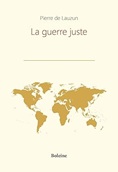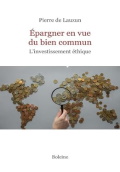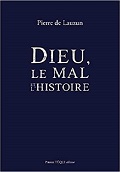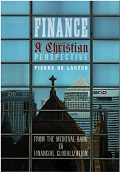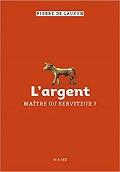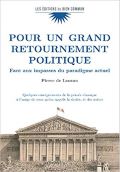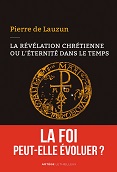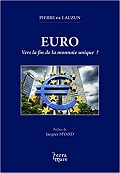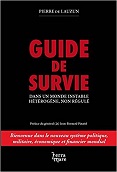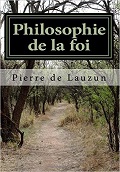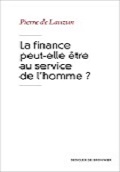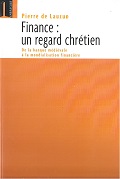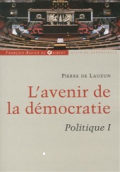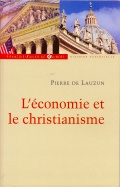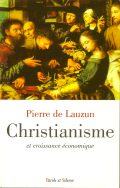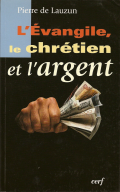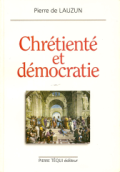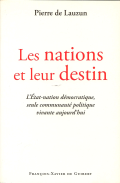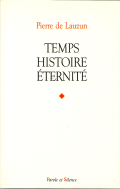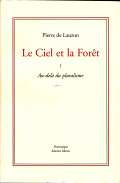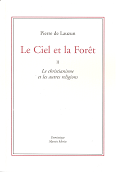
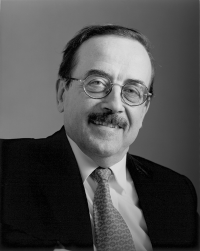

Derniers commentaires
- Un commentaire sur :
Sans titre
- Un commentaire sur :
Sans titre
- Un commentaire sur :
Sans titre
- Un commentaire sur :
Sans titre
- Un commentaire sur :
Sans titre
- Un commentaire sur :
Sans titre
- Un commentaire sur :
Sans titre
- Un commentaire sur :
Sans titre
Finance A Christian Perspective
mardi 29 juin 2021
Translation in English of my book ’Finance un regard chrétien’
From the publisher
"About the Book
This book, perhaps startlingly, is about finance from a Christian point of view, taking its start from the Gospels and moving forward to modern Catholic Social Teaching and today’s opaque money markets, pausing along the way to delve into the origins of finance in the Christian Middle Ages. Not only those with a Christian orientation, but anyone looking for a coherent, moral view of finance will profit from its keen insights.
Markets represent free, responsible interaction among human beings, and for this reason their functioning cannot escape close scrutiny in view of moral duty and the common good—precisely the sort of scrutiny this work offers in abundance. As former CEO of financial institutions, Chairman of the French Association of Catholic Economists, member of the French Catholic Academy, seasoned financial practitioner, and scholar of Catholic social teaching, Pierre de Lauzun is uniquely suited to this task.
The French edition of this book was awarded the 2015 International Prize of the Centesimus Annus Pro Pontifice Foundation by the Vatican. "
https://angelicopress.com/products/... *
Addition as of August 30.2021
Commentary from the US Amazon site.
Thanks a lot, Dr Kwasnievski !
Dr. Peter A. Kwasniewski 5.0 out of 5 stars
An historically informed treatment of finance by an experienced banker and sincere Catholic Reviewed in the United States on August 25, 2021
"To be honest, I wasn’t expecting to enjoy this book, for two reasons. First, I find the topic of economics rather dull. Second, I was suspicious of a book by a banker and financier that had won the 2015 International “Economy and Society” Prize of the Centesmius Annus Pro Pontifice Foundation of the Vatican.
Nevertheless, I was pleasantly surprised, edified, and challenged by reading this extremely readable book by an author whose theological mind and historical learning are clearly equal to his skill set in the financial world, and while I am uncertain whether or not to agree with some of his arguments about usury and wealth creation, I respect him very much for his well-grounded and cogent views.
De Lauzun notes that only the religious texts of the Christian tradition make such a prominent use of economic metaphors and lessons, and that some of the basic principles of free market economies are, in fact, rather startlingly outlined there. At the same time he recognizes that Christianity issues an absolute challenge to any supposedly self-contained and self-sufficient earthly system, by reminding us that we will lose everything, including ourselves, if we do not primarily invest in eternal life, if we do not seek spiritual wealth, cultural wealth, the wealth of persons in relationship—none of which is material.
Fascinating is de Lauzun’s detailed summary of medieval economic thought : the just determination of prices in Aquinas and subsequent scholastics (Godfrey of Fontaines, Peter John Olivi, Duns Scotus, St. Bernardine of Siena, Luis de Molina, John Buridan, Henry of Ghent, St. Antoninus, et al.), with reference to such concepts as common estimation of value, comparison of marketplaces, analysis of costs and profits, supply and demand, risk factors, proportionality, due knowledge of relevant circumstances, negotiated price, and coercion. Along the way the author critiques a number of modern writers who badly misinterpret the medievals. De Lauzun explains why it was the Franciscans, of all religious, who most propelled the science of economics : they managed common funds to which they had renounced individual claims, and were considered more objective and more trustworthy.
One of the most important contributions is de Lauzun’s summary of the entire debate on usury, at a level of sophisticated that is seldom seen. He patiently collects the data from Scripture and the philosophers, looks at sociological and anthropological arguments, and indicates with a wealth of examples how often interest was practiced in hidden ways or in ways approved by the moralists. A major theme emerges : the role of credit in any economy, and the positive value this credit has of itself. After presenting the standard arguments against usury, de Lauzun finds a new way to frame the question in terms of the “destination” of money—what money in society is for, and how it generates stability, productivity, and profitability. All this is the first part of the book.
The second part is a critique and defense (in different respects) of the enterprise of finance in light of Catholic Social Teaching, with the sources of which the author shows a good familiarity. It is clear that he is no rugged individualist who promotes a specious “free-market capitalism” ; rather, he points to how finance becomes a destructive force when it is detached from human values, Christian virtues, and an explicit orientation to the common good of the society, which ought to delimit and direct all activities, including financial ones. Instead of leaving this description at a level of unobjectionable but useless generality, de Lauzun furnishes examples drawn from his experience as a CEO and financial practitioner.
It is perhaps this vibrant quality of realism, this combination of carefully thought-through doctrine and hands-on business sense, that makes this book stand out in the literature of Catholic Social Teaching with which I am familiar. De Lauzun does not dismiss the critique of capitalism offered by personalists and socialists, which he ably recounts, but tries to show that a business and finance economy does not necessarily conflict with the good of persons or of society as a whole ; on the contrary, in its normal operation, it furnishes conditions of human flourishing. The author does not dispute that markets must be regulated and that a strong juridical framework is necessary in order to avoid, or at least limit, exploitation, manipulation, and social chaos.
Distributists would no doubt find much to object to in this book, but I would still recommend it to them, for the simple reason that De Lauzun is a highly intelligent interlocutor and in fact deeply attuned to the concerns of Catholic Social Teaching. He makes no attempt to downplay the causal role of Christian moral commitment and just laws in the beneficial functioning of any economy."
Besoin de réaliser votre site internet ? - Conception & réalisation du site : WIFIGENIE.NET
 Envoyer à un ami
Envoyer à un ami Imprimer
Imprimer

